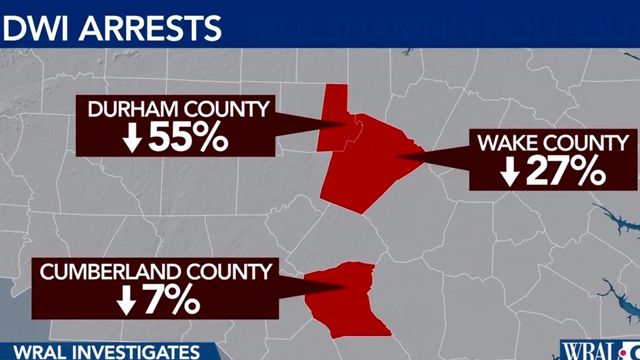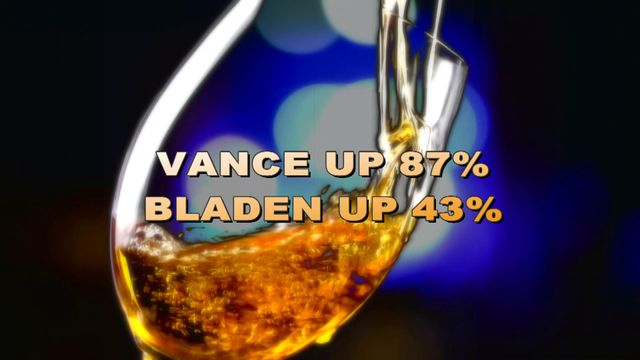Don't drink and drive: NC sees 30 percent drop in DWI arrests
Since 2014, driving while impaired arrests in North Carolina are down 30 percent. While several factors play a role in the decline, including anti-drunk driving campaigns, changing law enforcement tactics or fewer law enforcement personnel, the timing also coincides with the explosion of ride-sharing services across the state, a WRAL News investigation found.
Posted — UpdatedMothers Against Drunk Driving of North Carolina Program Director Jennifer Lichtneger says her group is also tracking the drop.
“Overall trends we have seen [show] things go down quite a bit, particularly in our metropolitan areas," she said.
Those metropolitan areas, like Charlotte and Raleigh, were the first to see the introduction of Uber and Lyft.
“We do attribute that to people being able to access, being able to get rides,” Lichtneger said.
In Wake County, DWIs are down 27 percent in that timeframe. In counties including Charlotte and Durham, DWI arrests have dropped in half.
“I think people aren't willing to roll the dice with their jobs, with their finances, but most importantly with their lives,” says North Carolina State Highway Patrol Sgt. Chris Knox.
He said he feels the repeated messages about the dangers and costs of drunk driving, as well as more options for people to get home safely, are both helping make state roads safer.
“When you talk about driving while impaired, it has that negative stigma, and I think everybody gets that," Knox said.
Knox said he also feels there’s a cultural shift, one WRAL Investigates saw after a night out on the town. North Carolina State University seniors Krista Duffield and Allie Fogleman say ride-sharing is a way of life for them.
“If I’m consuming any alcohol, like I’m not taking my car. I’m going to Uber instead,” said Duffield.
When she first went to college, Duffield says, her parents loaded the Uber app on her phone and put money in the account, encouraging her to use it whenever necessary.
“Why risk it if I know I can pay like maybe $10, and that’s probably what I would pay in parking anyway,” said Fogleman.
She says her generation uses ride-sharing for more than just a night out on the town.
“The culture that we’ve grown up with have always used Uber and Lyft as a way to get downtown and from downtown back to home.," she said.
Ryan Hofmeister, who also enjoys spending a night out on Glenwood South, says having options makes going out safer and less stressful. He says there’s no excuse for anyone to get a DWI considering today’s choices.
“If you get a DWI or DUI and you have a phone, it’s almost, you have ways to prevent it now, like you shouldn’t be in that situation," he said.
The prevalence of ride-sharing also eases the minds of bar managers. Tim Paine, of the Raleigh Beer Garden, says ride-sharing is a growing part of almost everyone’s party plans.
“We can see it here every night, especially on the weekends, when our customers are leaving, you can see them waiting for their Ubers or Lyfts,” he said. "It’s just one less thing that we have to worry about at the end when people are leaving, like if we need to take their car keys, we need to find them a ride, if we need to call a cab. They usually have it all taken care of and have it on their phone and ready to go.”
“People tend to think twice now when they go out,” says Uber driver Kenneil Harding.
He says the side job he started to earn some extra cash took on more meaning when he started driving weekends and realized he was saving lives.
"As a driver, you have an obligation, a responsibility to make sure, you know, things like that stay down because you don’t want to see on the news somebody passed away because of, you know, drunk driving," he said.
After a bump in DWI deaths early last year, fatalities are down 50 percent this year. Whatever the reason or reasons for the decline, Knox says the ease of ordering a ride-share and knowing the cost is helping.
"With all these different companies that are out there, there is no excuse to get in the car after you’ve been drinking," he said.
While metropolitan areas and many other parts of the state are seeing a decrease in DWI arrests, 14 out of the 16 counties that have seen an increase since 2014 are more rural. Lichtneger hopes to see all of the counties on a downward trend, but says technology and availability in smaller towns will have to improve before ride-sharing makes an impact.
“Having access to the people that can drive, as well, because you don’t have that population there," she said.
Related Topics
• Credits
Copyright 2024 by Capitol Broadcasting Company. All rights reserved. This material may not be published, broadcast, rewritten or redistributed.






